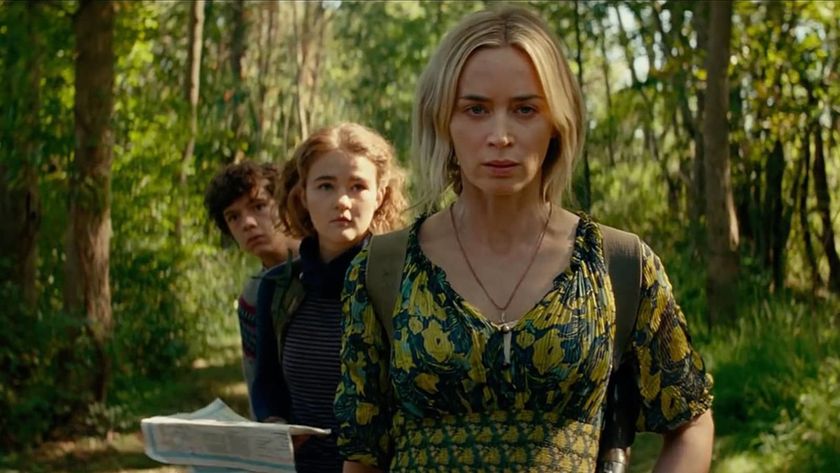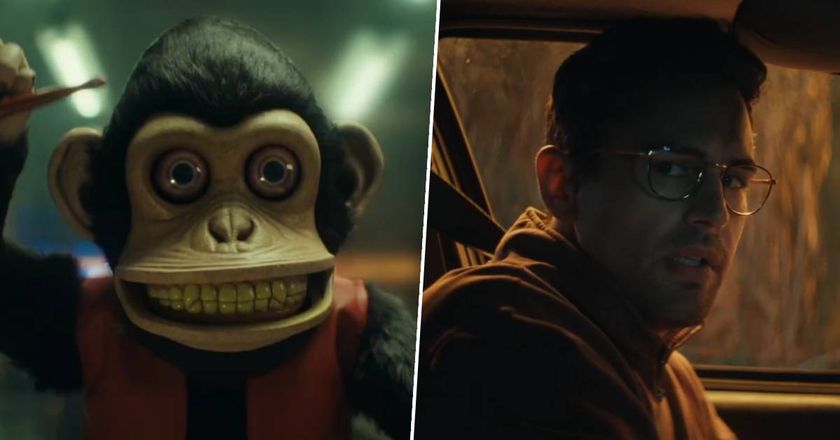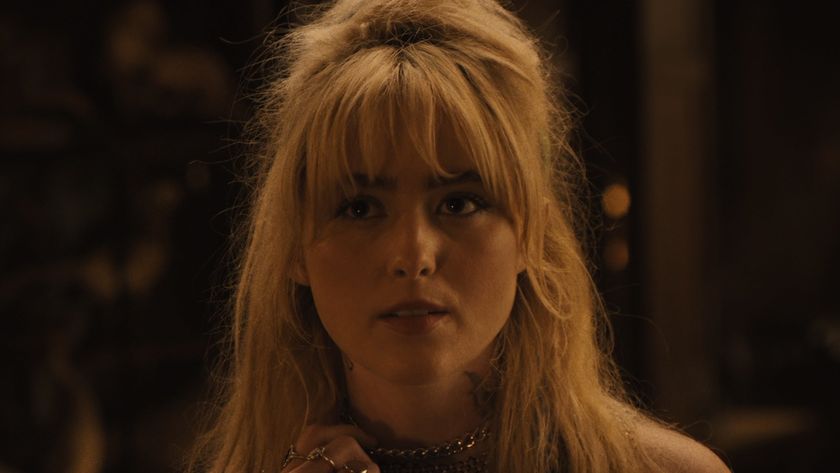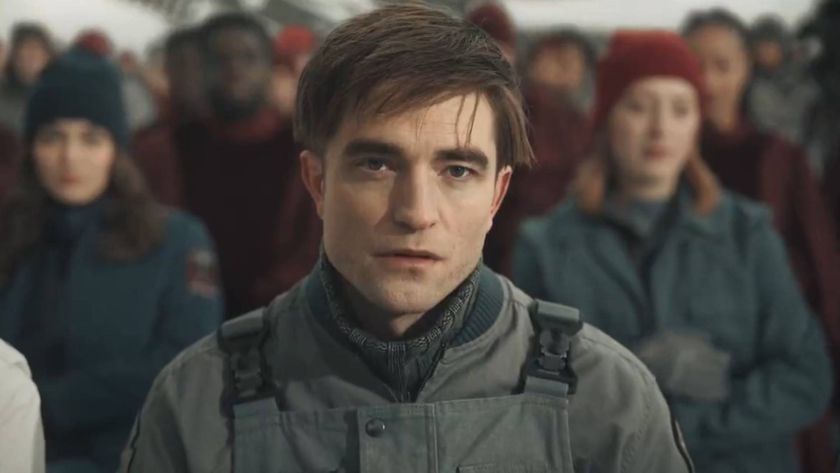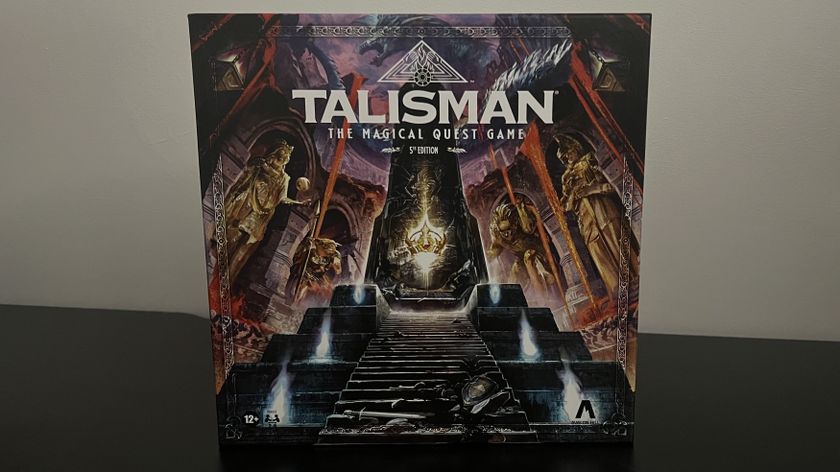The Making Of Julia's Eyes
Guillermo del Toro presents...
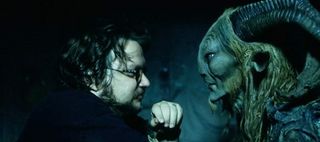
Guillermos Vision
Google the phrase ‘Julia’s Eyes’, and two main topics come up. One is how to apply make-up just like Julia Roberts. The other is a slew of articles about a new Spanish horror film.
While we’re genuinely interested in seeing how we can get Julia Roberts’ look, it’s the latter that grabs our attention. For no other reason than another well-known name: Guillermo del Toro.
Back in August 2009, when the Pan’s Labyrinth director was still deep in pre-production work on The Hobbit , he signed on to help guide another burgeoning new filmmaker’s vision to the big screen.
Or, as the case would be with Julia’s Eyes , his vision of a lack of vision. Having helped the likes of J.A. Bayona ( The Orphanage ) and Vincenzo Natali ( Splice ) make their own uniquely dark horror tales into movie realities, del Toro spied something interesting in fledgling director Guillem Morales' Julia's Eyes script, which he co-wrote with Oriol Paulo.
Says Paulo: “The thriller's an excuse to talk about a woman who overcomes her limitations; it's a journey of self-discovery...”

Guillermos Philosophy
“When the economic crisis hit, we were in the middle of the largest box office year in the history of cinema,” del Toro told Deadline at the time. “Everybody got conservative, and the contraction led to a dismal things.”
His answer to the economic crisis’ effect on cinema? Be “bold” and make left-of-the-middle films that don’t necessarily look like commercial money-spinners, but have two vital things in common – strong storytelling and gorgeous visuals.
“It won’t get better unless you get bold. This timidity has done a lot of damage in the most fragile places,” the power producer continues. “Imagine, there is almost no possibility for a foreign language film to be distributed in America right now.
“That doesn’t just make the industry poorer, it makes the landscape of cinema poorer, in America. The impossibility to get a good release on a really good European, Latin American, Asian movie is a tragedy...”
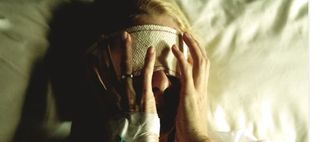
Guillems Plot
It’s not difficult to see why del Toro was so taken with Guillem Morales and Paulo’s story. Following the titular Julia, it tracked her attempts to solve the death of her twin sister. At the same time, a genetic condition means that she’s slowly going blind.
For Guillem, the idea behind Julia’s Eyes came about after he saw an image of a blind woman wearing bandages.
“I think everything starts with an image,” he tells Flicks And Bits , “in this case it was a blind woman wearing a bandage around her eyes.
“The only thing I knew about her was that she had been operated on and been told not to remove the bandage for two weeks, otherwise the results of the operation would be ruined. It was the only information I had. From that point on, you have to create a plot, a character, and ask questions about what the image suggests to you...”

Guillems Meeting
Morales first met with Guillermo del Toro in London, when he pitched him the general concept of Julia’s Eyes. Unfortunately, it didn’t really go as he’d planned.
“The very first time I met him was in London,” says Morales. “It was a disaster because I was talking about that part of the film that nobody understood and also the end of the film, which I won’t spoil. In the first draft it was much more radical, so I think he thought that I was totally crazy for trying to do something like that!”
Happily, Morales managed to score a second meeting with the producer. This time, del Toro told the fledgling filmmaker that he “loved the story”. In return, Morales has nothing but glowing things to say about the Mexican movie guru.
“He’s one of the most generous people I’ve ever met in the film world,” the director confides. “If you have a problem, you know that he’s always there for you. He wants to make sure that the film will be the best film [ it can be ] and you have everything that you need to make the best film possible.
“It’s like having an angel protecting you if you have a problem. He’s not only a producer, he’s a director as well so he understands perfectly what a director needs on the set. We didn’t agree on some things but he respected my thoughts.” Meanwhile, del Toro admired Morales' ambition...
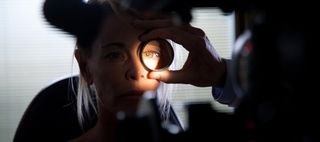
Guillems Ambition
“In Julia’s Eyes ,” del Toro says, “Guillem put in the screenplay that for the next 20 minutes, while Julia has bandages on her eyes, the audience won’t see the faces of the characters: ‘We will hide them.’
“I told him, that’s nice to say, but you can’t. He said, you’ll see. I didn’t believe it, but then you see the movie, and it’s fantastically daring.”
And if del Toro likes anything, it’s a director with kahunas. “It’s easy in retrospect to say, of course Guillermo would produce The Orphanage ,” the multi-hyphenate says.
“But when you haven’t made the movie or seen any work by that filmmaker, it’s a true bet and you are putting your name on the line and saying to the director, either we both swim to land, or we sink together...”

Belns Choice
Pivotal to Morales’ film would be the casting of Julia. Whoever landed the role would be put through their paces by the film’s emotional, often horrific content.
After working with Spanish actress Belén Rueda on The Orphanage , del Toro suggested her for the part.
Like del Toro, it took Rueda a few reads of the script before she fully understood the extent of the ambitious story.
“Sometimes when you read a script for the first time it’s very easy to understand,” she says, “but this one was very difficult because for around 20 minutes you don’t see any of the character’s faces.
“There is only one line in the script that explains this, so if you miss it you don’t understand anything – and it happened to me! So I had to go back…”
Eventually, though Rueda signed on to the film, and her director has nothing but praise for her courageous performance...

Guillems Julia
“I think she’s one of the greatest actresses we have in Spain, if not the best one,” Morales says of Rueda. “When we met the very first time, I could feel already the very important thing in the relationship between the actress and the director – trust.
“Trust is the most important thing you need. We could trust each other perfectly. I suppose it’s like falling in love, you come across your character with a great actress, and she loved the script and of course I loved her, but I couldn’t imagine Belén would say, ‘Yes I would love to play Julia.’”
For Rueda, the hard work was only just beginning...
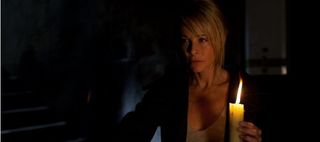
Belns Research
In order to fully understand the overwhelming sense of confusion and isolation that Julia would feel while losing her eyesight, Rueda embarked on an exhaustive research mission.
She took to the streets meeting vision impaired people, and even found that the contact lenses she wore during filming changed the way she approached the role.
“You feel things bigger when you can’t see!” she laughed. “Your emotions are bigger than before because you feel cut off from the rest of the world and all that’s left is what is inside you. So you feel very vulnerable and your performance is made more difficult.”
The role also proved a challenge because Rueda would have to play both Julia and her twin sister Sara.
“The two sisters are very different,” she says. “Julia tries to live a quiet life because she knows that any stress is going to make her condition worse, and her sister Sara is the opposite...”
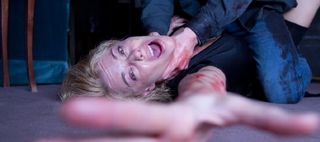
Belns Terror
Like the best horror films, Julia’s Eyes isn’t just concerned with scaring the living daylights out of unwitting audiences – it also attempts to see the world through Julia’s eyes.
“It’s important when you choose a role that it feels real to you, even if it’s a terror film,” Rueda says. “What happens in your mind and your body have to feel real to you because that is how you make the people watching the movie believe what’s happening could be true. So it has to be more than scary.
“Guillermo del Toro said once that a terror film is about physical pain, while a horror film is about emotional pain. I said to him that Julia’s Eyes is both!”
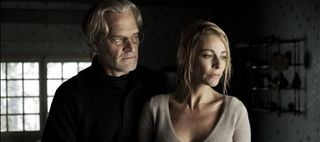
Julias Eyes
Having premiere in Spain in October 2010, Julia’s Eyes finally reaches UK shores this Friday. And it’s riding a wave of positive reactions from those who've already seen it.
“If you can tolerate an overly long film,” says Bloody Disgusting , “ Julia's Eyes gives homage to classic Argento flicks and is still extremely well made.” Meanwhile, FEARnet commended the film as “a classy and lovely horror film to look at”.
It seems that Guillermo del Toro’s fearless, nurturing approach to moviemaking has again paid off. “This is the time to be bold,” the producer insists.
“There is a saying in Spanish, ‘The raging river is a fisherman’s gain.’ Which means, when the river is raging, few people jump in, but they bring out a lot of fish. This is the time to be bold.
“If we are not, the self fulfilling prophecy is dying. I love that Chris Nolan did Inception . He did it because he can, but I assure you, this was not easy to push through.
“Whether bold movies succeed or fail, they don’t go unnoticed. Movies that are timid definitely are not succeeding in this time. The problem we have as a craft and artistry medium, we can only hope to be defined by our hearts.”
Josh Winning has worn a lot of hats over the years. Contributing Editor at Total Film, writer for SFX, and senior film writer at the Radio Times. Josh has also penned a novel about mysteries and monsters, is the co-host of a movie podcast, and has a library of pretty phenomenal stories from visiting some of the biggest TV and film sets in the world. He would also like you to know that he "lives for cat videos..." Don't we all, Josh. Don't we all.
